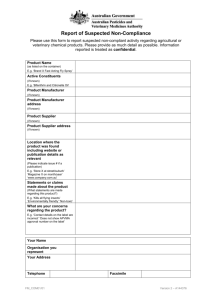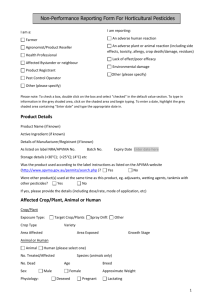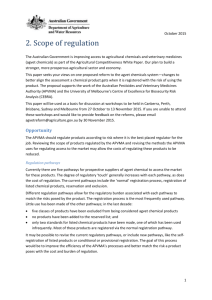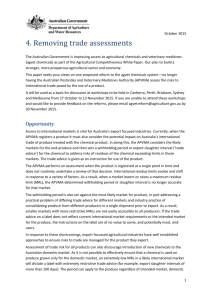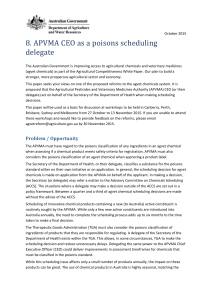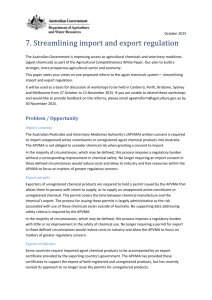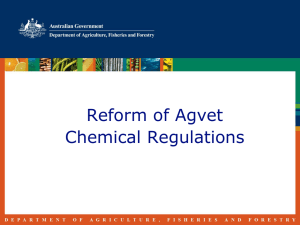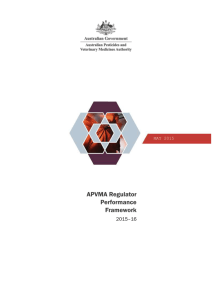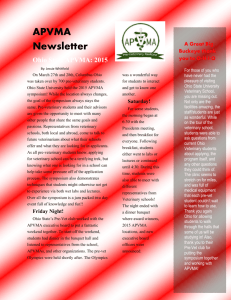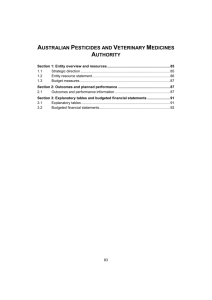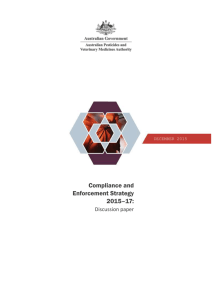Word - Department of Agriculture
advertisement
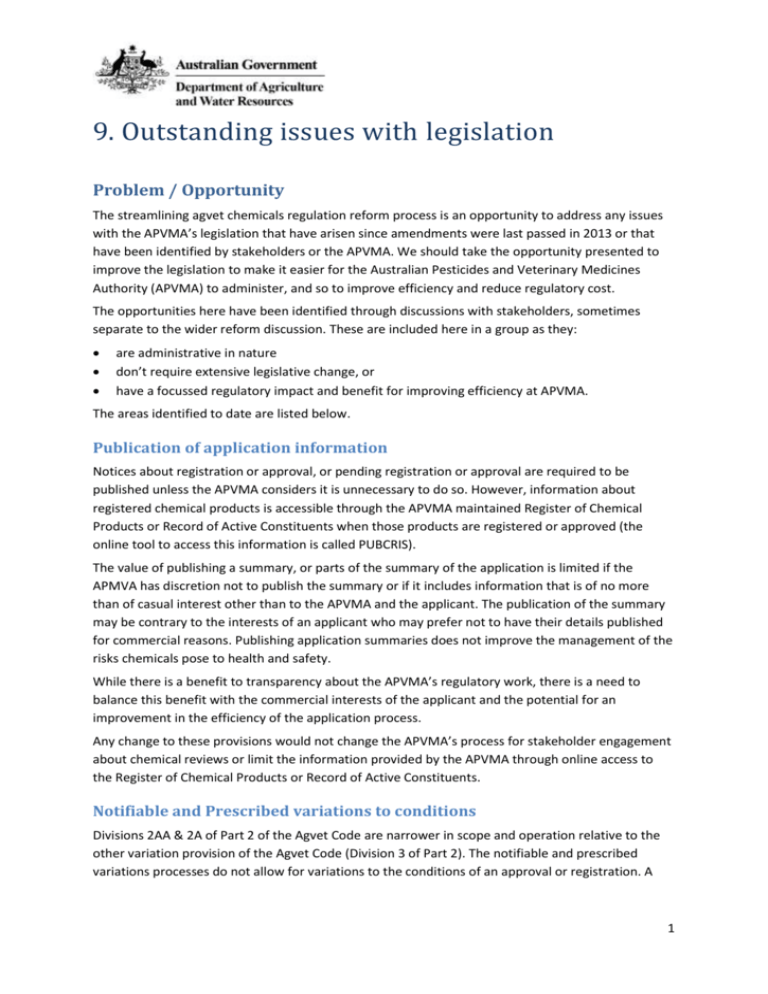
9. Outstanding issues with legislation Problem / Opportunity The streamlining agvet chemicals regulation reform process is an opportunity to address any issues with the APVMA’s legislation that have arisen since amendments were last passed in 2013 or that have been identified by stakeholders or the APVMA. We should take the opportunity presented to improve the legislation to make it easier for the Australian Pesticides and Veterinary Medicines Authority (APVMA) to administer, and so to improve efficiency and reduce regulatory cost. The opportunities here have been identified through discussions with stakeholders, sometimes separate to the wider reform discussion. These are included here in a group as they: are administrative in nature don’t require extensive legislative change, or have a focussed regulatory impact and benefit for improving efficiency at APVMA. The areas identified to date are listed below. Publication of application information Notices about registration or approval, or pending registration or approval are required to be published unless the APVMA considers it is unnecessary to do so. However, information about registered chemical products is accessible through the APVMA maintained Register of Chemical Products or Record of Active Constituents when those products are registered or approved (the online tool to access this information is called PUBCRIS). The value of publishing a summary, or parts of the summary of the application is limited if the APMVA has discretion not to publish the summary or if it includes information that is of no more than of casual interest other than to the APVMA and the applicant. The publication of the summary may be contrary to the interests of an applicant who may prefer not to have their details published for commercial reasons. Publishing application summaries does not improve the management of the risks chemicals pose to health and safety. While there is a benefit to transparency about the APVMA’s regulatory work, there is a need to balance this benefit with the commercial interests of the applicant and the potential for an improvement in the efficiency of the application process. Any change to these provisions would not change the APVMA’s process for stakeholder engagement about chemical reviews or limit the information provided by the APVMA through online access to the Register of Chemical Products or Record of Active Constituents. Notifiable and Prescribed variations to conditions Divisions 2AA & 2A of Part 2 of the Agvet Code are narrower in scope and operation relative to the other variation provision of the Agvet Code (Division 3 of Part 2). The notifiable and prescribed variations processes do not allow for variations to the conditions of an approval or registration. A 1 simplified approach to varying conditions would improve the efficiency of that administrative process. Simplifying the process of varying conditions would, for example, allow for routine changes to the shelf-life or expiry date for a date controlled product after a period of time in the market and so allow for earlier access to the market while shelf-life data was prepared and submitted for a streamlined assessment. The current practice process imposes administrative complexity and an assessment timeframe not commensurate with the risks being managed. False and misleading information in variation applications The APVMA has a mechanism to act on an approval or registration if false or misleading information is given to it. But the provision applies only in relation to information given by the holder in connection with an application for approval or registration and does not apply in connection with other applications in relation to an approval or registration (for example, an application to vary a registration). Suspended label variation The APVMA may not vary a label approval where the approval is suspended. This means APVMA may not amend a label to address the problem that required the label approval to be suspended without revoking the suspension. Standard setting The authority for the APVMA to make standards APVMA is limited to standards for constituents of chemical products, chemical products and labels for containers of chemical products. Other matters that relate to product safety, such as product packaging, would benefit from a standards-based approach. Commonwealth co-ordinator While the Australian Government is a partner in the National Registration Scheme (NRS)(established through an intergovernmental agreement), for the purposes of the Agvet Code’s operation the Australian Government is not afforded the same opportunity for input on certain matters as the other partners in the NRS. For example, prior to suspending or cancelling an approval or registration, the APVMA must give notice to the co-ordinator of each jurisdiction and provide time for comment to be received. Manufacturing tolerances Existing provisions require that a registered chemical product comply with the particulars recorded for that product, including the concentration of each constituent. No provision exists to allow for the routine (safe) variations in constituent concentration arising in manufacturing. Levy leakage The supply of unregistered chemical products under permit is subject to the same levy liability as the supply of registered chemical products. Due to complexities in supply arrangements, the liable entity is often unclear and in practice the APVMA has difficulty collecting levies on unregistered products supplied under permit. Ensuring the collection of levy on unregistered products supplied under permit allows users of those products to contribute to the costs of the permit system and reduces cross subsidisation of costs between registered products and products used under permit. Record and register a variation on APVMA own initiatives The Record of Approved Active Constituents and the Register of Chemical Products are maintained by the APVMA but the APVMA does not have the ability to make simple changes such as to remove entries in the Register of those products that were cancelled some time ago. Genetically modified plants The seeds for plants, genetically modified to be more resistant to a chemical product or to be more resistant to pest pressures, are regulated by the APVMA as an agricultural chemical product and also by the Office of the Gene Technology Regulator (OGTR). This means that the risks posed by these products to users or the environment are assessed twice with no benefit to improved safety. It may be possible to remove viable plant material from regulation by the APVMA to remove this duplication and improve the efficiency of regulation for these products. Genetically modified viable plant materials would continue to be regulated by OGTR. (The risks associated with incorporating the produce of genetically modified crops into food for human consumption are, and would continue to be managed separately by Food Standards Australia and New Zealand.) Nominated agents All registrants of chemical products from places outside Australia must have a nominated agent within Australia. But APVMA’s legislation does not require that a nominated agent be in place at the time an application is made to register a product. Chemical industry stakeholders have advised this discrepancy introduces unnecessary confusion and cost. What we have heard For many stakeholders, administrative or operational reform is less significant to more fundamental reform to agvet chemical regulation outlined in other proposals. Stakeholders recognised that the administrative and operative shortcomings individually have only minor effect but add to inefficiencies in the system. Stakeholders expect that government processes will allow these identified issues to be rapidly addressed with minimum of effort after identification and validation. As consultation continues on the wider reforms it is expected that other examples of improvements to the administrative and operative areas of agvet legislation will be identified and incorporated into the final reform package. The proposed reform measure The localised nature of the administrative reform opportunity allow for more specific and detailed proposals to be presented than for other reform options. Outlined below is a possible approach to addressing each area, if progressed. It is probable that in progressing these administrative reforms not all areas will be addressed in a single package and the department will continue to discuss these matters with stakeholders. Publication of application information Omit ss 8H, 8J and 11(2)(b) of the Schedule to the Agricultural and Veterinary Chemicals Code Act 1994 (Agvet Code). Information about new approvals and registrations would continue to be available through PUBCRIS. Notices about new active constituents and new products with existing active constituents would continue to be published under ss 12 and 13 of the Agvet Code; these sections allow submissions from stakeholders about whether these chemicals should be approved or registered before it occurs. Notifiable and Prescribed variations to conditions Extend the operation of Divisions 2AA & 2A of the Agvet Code to include variations to conditions of approval or registration. We propose also to allow variation of the condition of registration that relates to expiry date as a prescribed variation. False and misleading information in variation applications Extend the operation of s 38A to include information given in connection with an application to vary an approval or registration and information in connection with an application to approve or vary the approval of a label. Suspended label variation A person may apply to vary the particulars of a label approval that is suspended, to the extent that the variation relates to the matters cited as grounds for the suspension. Standard setting Extend the operation of s 6E of the Agvet Code to provide that the APVMA may make standards for matters within its responsibility and necessary for the efficient operation of the Agvet Code. Commonwealth Coordinator The Minister of the Commonwealth with responsibility for the APVMA may designate a person to perform the functions of a co-ordinator under the Agvet Code. Manufacturing tolerances Provide for regulations to be made prescribing allowable variations from the particulars recorded for the concentration of a registered chemical product to accommodate the normal, safe, variation that occurs in chemical manufacturing. Levy leakage In consultation with the APVMA, to establish mechanisms to ensure recovery of all currently liable disposals. We don’t propose to extend liability for levy beyond that already set out in legislation. Record and register variation on APVMA own initiative The APVMA may, in very limited prescribed circumstances, amend the particulars of the Record of Approved Active Constituents and Register of Chemical Products without the consent of the holder. Genetically modified plants Provide that whole plants, or viable seeds, are declared not to be agricultural chemical products. Genetically modified organisms would continue to be regulated by the Office of the Gene Technology Regulator. Next steps We acknowledge the diversity of areas within these administrative reforms and are also aware that stakeholders may have differing views across the range. We are keen to continue this discussion on these measures and others that may be identified through normal business practice. We will be hosting a series of workshops for all interested stakeholders to attend and provide their views on the proposed reform measures. To attend one of these workshops please fill in a registration form. If you can’t attend one of the workshops or would like to provide feedback separately then please send an email to agvetreform@agriculture.gov.au. When providing your feedback you might like to consider addressing the following questions: Do you support the proposed reform in its current form or would you like further detail? If you don’t support it, could the reform be amended to achieve your support? If so how? Are there any unintended consequences arising from this reform? Does the proposed reform result in new issues for you? Please provide your feedback by 30 November 2015 so we can consider it before finalising a policy paper outlining a comprehensive reform package that will be released for stakeholder comment in the first quarter of 2016.
